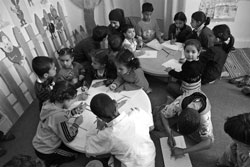The United Nations Refugee Agency reports that there are currently 1.85 million registered Syrian refugees who’ve fled their homeland in search of freedom from the persecution of the Syrian government. This astounding amount of people is the equivalent of having a forced evacuation of every single person living in the state of West Virginia.
Mass amounts of Syrians began fleeing their country around April 2011, one month after the start of the Syrian Civil War. The war was started by the Syrian government, led by the President Bashar al-Assad against various anti-government protest groups fighting for freedom and a better state.
The brute and violent methods by which Assad’s forces have attacked the Syrian people have left many Syrians with no option but to escape to the neighboring countries of Jordan, Lebanon, Turkey, and Iraq.
While being in refugee camps can be better in many respects, what exactly is it that these people escape to?
Most Americans would be unable to even imagine the devastating conditions of the refugee camps. Broken families live in tents, and barely survive on minimal amounts of food and water.
Contaminated water sources, squalid living conditions and lack of sanitation make previously simple daily tasks a dangerous struggle. There are decreased chances of survival for those who fall ill due to the lack of proper medical care.
However, the children forced to call these camps home will not always be seen crying. Instead, they play games, make drawings, and desperately hold on to any moments of happiness in their lives.
Miraculously, they have found life to be a beautiful experience, despite the colossal trials they are faced with.
Between abandoning their entire way of life, watching their families break apart, working dangerous jobs that pay around $2 a day, and perhaps having maimed limbs or psychological trauma, the Syrian children could be praised for their resilience and defiance. But more importantly, many think they should be helped, especially because they are being deprived of the universal and monumental benefits of a good education.
Momna Awan, sophomore communication major, said, “My heart breaks when I think about the millions of people around the world who live like this daily; people for whom even the most basic of needs are too much to ask for. These poor, innocent children are completely deprived of their childhood, yet are able to find happiness in the little things.”
She added, “Stories like theirs remind me to appreciate what I have and be thankful for it all. My problems cannot compare to what the people in these countries are going through.”
Dr. Saliba Sarsar, Associate Vice President for Global Initiatives, can relate to these children. “In the 1967 War, my brother Michael and I (both of us children) were separated from our family for several days, and it was unbearable. Imagine how children in Syrian refugee camps are feeling today,” said Sarsar.
While various aid organizations such as Save the Children and Islamic Relief USA are doing commendable work, the sheer number of refugees is proving to be a difficult obstacle to conquer.
Furthermore, the countries hosting the refugees are finding it increasingly difficult to support them all, particularly in Lebanon where one in four individuals is a Syrian refugee. Further, it needs to be noted how the mass influx of refugees has impacted the world at large.
Geography professor Vincent Joyce, commented on the situation. “As winter sets in Lebanon, Jordan and Iran, these refugee camps will become even more horrid with disease and degraded living conditions,” he said. “The host nations at first willing to help their Muslim brothers and sisters have had their economies gravely affected with this mass invasion of Syrians. The West and all well off nations need to do more to diffuse this mass migration. Germany has announced they will admit 5000 of the most needy refugees. The rest of the industrialized nations need to follow suit.”
Shayna O’ Connor, sophomore biology major, agreed. “It is truly gut-wrenching to read about what is happening in Syria. The war is murdering and maiming these children in more ways than just the physical sense. The childhood innocence and joviality that most of us are familiar with becomes merely a figment of the past to these young refugees,” said O’Connor. “These kids have their whole lives in front of them but have seen a lifetime of horror and bloodshed. It’s quite a lot to take in.”
With such blatantly obvious humanitarian injustices striking every day in Syria, its neighboring countries and many other parts of the globe, it becomes the responsibility of the rest of the world to take care of those in need. Increased awareness and action must be taken to ensure betterment of the global society as a whole.
Sarsar added, “When will countries stop hiding behind their distinct national sovereignty in support of international decency and law and our common humanity? The refugees in Syrian camps cry out in desperation. They deserve our attention, empathy, and support. The children deserve a better future.”
IMAGE TAKEN from vita.it




